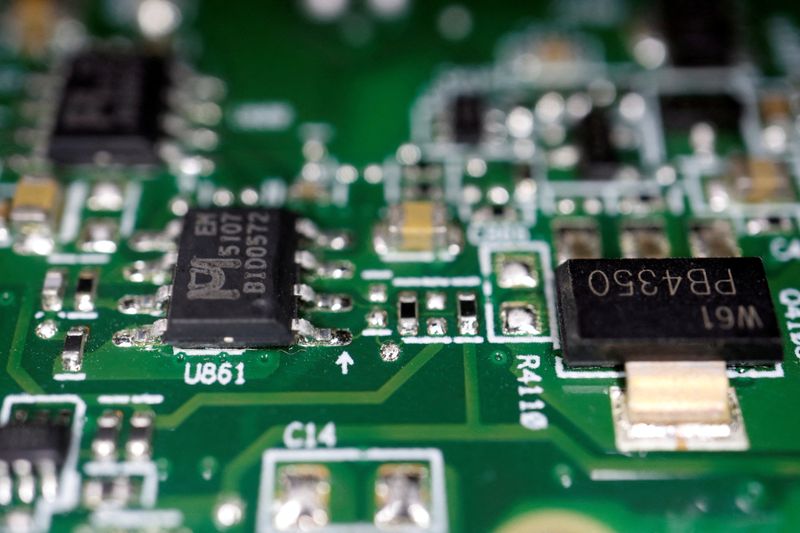US tightens its grip on AI chip flows across the globe
2025.01.13 13:31
By Karen Freifeld
NEW YORK (Reuters) -The U.S. government said on Monday it would further restrict artificial intelligence chip and technology exports, divvying up the world to keep advanced computing power in the United States and among its allies while finding more ways to block China’s access.
The new regulations will cap the number of AI chips that can be exported to most countries and allow unlimited access to U.S. AI technology for America’s closest allies, while also maintaining a block on exports to China, Russia, Iran and North Korea.
Unveiled in the final days of outgoing President Joe Biden’s administration, the lengthy new rules go beyond China and are aimed at helping the United States maintain its dominant status in AI by controlling it around the world.
“The U.S. leads AI now – both AI development and AI chip design, and it’s critical that we keep it that way,” Commerce Secretary Gina Raimondo said.
The regulations cap a four-year Biden administration effort to hobble China’s access to advanced chips that can enhance its military capabilities and seek to maintain U.S. leadership in AI by closing loopholes and adding new guard rails to control the flow of chips and global development of AI.
While it is unclear how President-elect Donald Trump’s incoming administration will enforce the new rules, the two administrations share similar views on the competitive threat from China. The regulation is set to take effect 120 days from publication, giving the Trump administration time to weigh in.
New limits will be placed on advanced graphics processing units (GPUs), which are used to power data centers needed to train AI models. Most are made by Santa Clara, California-based Nvidia (NASDAQ:), while Advanced Micro Devices (NASDAQ:) also sells AI chips. Nvidia shares were down about 5% while AMD shares were down about 1% in morning trading.
Major cloud service providers such as Microsoft (NASDAQ:), Google (NASDAQ:) and Amazon (NASDAQ:) will be able to seek global authorizations to build data centers.
Once approved, the cloud providers would no longer need export licenses for AI chips, allowing them to build data centers in countries that cannot import enough chips because of the U.S.-imposed quotas.
Shares of all three companies were down about 1%.
To obtain a stamp of approval, authorized companies must abide by stringent conditions and restrictions, including security requirements, reporting demands and a plan or track record of respecting human rights.
Until now, the Biden administration had imposed sweeping restrictions on China’s access to advanced chips and the equipment to produce them, updating the controls annually to tighten restrictions and capture countries at risk of diverting the technology to China.
NVIDIA FEARS ‘OVERREACH’
Because the rules alter the landscape for AI chips and data centers around the world, powerful industry voices criticized the plan even before it was published.
Nvidia on Monday called the rules “sweeping overreach” and said the White House would be clamping down on “technology that is already available in mainstream gaming PCs and consumer hardware.” Data center provider Oracle (NYSE:) argued earlier this month that the rules would hand “most of the global AI and GPU market to our Chinese competitors.”
The restrictions do not apply to gaming chips.
The rules impose worldwide licensing requirements on advanced chips, with exceptions, and also set controls for what are known as “model weights” of the most advanced “closed-weight” AI models. Model weights help determine decision making in machine learning, and are generally the most valuable elements of an AI model.
The regulation divides the world into three tiers. About 18 countries, including Japan, Britain, South Korea and the Netherlands, will essentially be exempt from the rules. Some 120 other countries, including Singapore, Israel, Saudi Arabia and the United Arab Emirates, will face country caps. And arms-embargoed countries like Russia, China and Iran will be barred from receiving the technology altogether.
In addition, U.S.-headquartered providers likely to receive global authorizations such as Amazon Web Services and Microsoft will be allowed to deploy only 50% of their total AI computing power outside the United States, no more than 25% outside of the Tier 1 countries and no more than 7% in a single non-Tier 1 country.
“How effective the rule ends up being in the next 10 to 15 years is now up to the incoming team,” said Meghan Harris, a national security official during the first Trump administration. “They are well aware that ensuring a dominant domestic industry is a core element of competition with China.”
China’s Commerce Ministry said in response to the new rules that China will take necessary measures to safeguard its “legitimate rights and interests”.

AI has the potential to increase access to healthcare, education and food, among other benefits, but also can help develop biological and other weapons, support cyberattacks and assist with surveillance and other human rights abuses.
“The U.S. has to be prepared for rapid increases in AI’s capability in the coming years, which could have transformative impact on the economy and on our national security,” U.S. National Security Adviser Jake Sullivan said.








